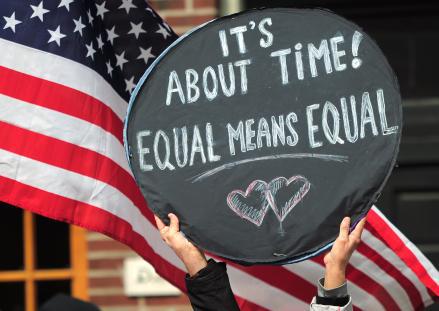It’s such an amazing pleasure and privilege to dive into this year’s Supreme Court rulings with you. This is a venerable Slate tradition, begun by the amazing Dahlia Lithwick with (of course) you, Walter. The rest of us late-comers will do our best to uphold it. Today, the court didn’t do anything blockbuster. So that gives us a chance to look back before we get to chew over the decisions on affirmative action, the Voting Rights Act, and gay marriage next week.
I want to start by zooming back a whole year, to the end of the 2012 term. The climactic moment last June in which Chief Justice John Roberts swooped in to save Obamacare led to a lot of wondering about his intentions. Basically it came down to this: Had George W. Bush’s steely man of the right—his perfect choice for chief—gone soft? In casting the fifth vote to uphold Obamacare, was Roberts taking a first step down a sinister sinistra (leftward) path? Could he become the latest conservative to come down with the dreaded curse of late-blooming liberal-ish tendencies? My own feeling was and remains: no way. Much more evidence shows Roberts as a chief who is moving the court to the right in careful, deliberate increments. He is playing the long game. This term, so far, his most revealing moment came in City of Arlington v. FCC. It’s a kind of obscure case about the Federal Communications Commission’s power over the location of cellphone towers, but Roberts used it to rail against the size of the federal bureaucracy, “poking into every nook and cranny of daily life,” and also to fight with Scalia over how best to dismantle it, as Doug Kendall explained in Slate. The two justices share the same end. Still, Is Roberts v. Scalia a real thing—a sign of a meaningful and potentially lasting conservative schism? Or is that just a lullaby actual liberals sing to themselves?
Speaking of Scalia, what did you make of his impassioned cry for civil liberties in Maryland v. King? In that one, five justices (the other conservatives plus Stephen Breyer) ruled that states can collect DNA from everyone who gets arrested for a serious crime. Scalia dissented, warning of worse to come: “Make no mistake about it: As an entirely predictable consequence of today’s decision, your DNA can be taken and entered into a national DNA database if you are ever arrested, rightly or wrongly, and for whatever reason.” This is the kind of just-you-wait prediction he made 10 years ago to warn that preventing the states from criminalizing sodomy would one day lead to gay marriage. Next week, we will find out if he was right about that. Either way, what do you think of dire prediction as a rhetorical strategy?
And what about the court’s decision against gene patenting? I bought the distinction Justice Clarence Thomas made, for a unanimous court, between naturally occurring DNA (no patenting allowed) and synthetic DNA. But people who know much more about biotech than me said it’s meaningless and anachronistic. Did the court blow it, or does this argument reflect an inevitable gap in approach and understanding between law and science?
I also want to know what you make of this term’s business decisions. Dick, you and Lee Epstein and Bill Landes have crunched numbers that convinced me that the court is even more pro-business than I thought before. Which is saying something. How do this term’s rulings add to, or change, that picture?
Next week, we will of course talk about the court’s take on race in Ameica and whether it means life or death of the Voting Rights Act and affirmative action. Any predictions? I will say that as a gay-rights supporter, I’m feeling optimistic about both of the gay-marriage cases. I think the court will strike down the part of the Defense of Marriage Act that defines marriage as the union of a man and a woman for purposes of receiving federal benefits. And I think it will also find a way to get rid of California’s gay marriage ban, without foisting gay marriage on the rest of the states that have yet to vote for it.
For me, the term’s braiding of race and sexuality raises deep questions about timing. Are we about to see the Voting Rights Act, and affirmative action, go down because the court’s conservatives are just tired of seeing race as a defining factor in American life—and think the country is, too? And are we about to see the court make a welcoming overture toward gay marriage because that is the civil rights issue whose time has come? I want to know what you all think, and I also want us to keep an eye on these questions: Which justice has or will surprise you this term, by doing what? Which decision will seem the most off base, when we look back on the year? What will we remember most vividly?
For me, the answer to that last one is the sea of gay marriage supporters on the court’s front steps. I saw opponents, too, yes, but mostly I stopped and marveled at a stand for equality the like of which I would never have imagined as a teenager, or even 20 years ago. It felt like history.
